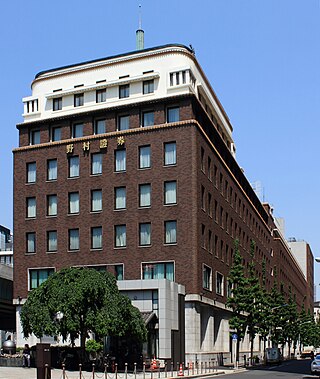EF Hutton was an American stock brokerage firm founded in 1904 by Edward Francis Hutton and his brother, Franklyn Laws Hutton. Later, it was led by well known Wall Street trader Gerald M. Loeb. Under their leadership, EF Hutton became one of the most respected financial firms in the United States and for several decades was the second largest brokerage firm in the country.

Wood Gundy Inc. was a leading Canadian stock brokerage and investment banking firm. Founded in 1905, it was acquired by the Canadian Imperial Bank of Commerce in 1988 as it attempted to build an investment banking business. The Wood Gundy name was used extensively by the bank's investment banking arm, which was known as CIBC Wood Gundy until 1997. Today, CIBC's investment banking business is known as CIBC World Markets, and the name CIBC Wood Gundy is used as the brand for the bank's retail brokerage business.

Lehman Brothers Inc. was an American global financial services firm founded in 1847. Before filing for bankruptcy in 2008, Lehman was the fourth-largest investment bank in the United States, with about 25,000 employees worldwide. It was doing business in investment banking, equity, fixed-income and derivatives sales and trading, research, investment management, private equity, and private banking. Lehman was operational for 158 years from its founding in 1850 until 2008.

Nomura Securities Co., Ltd. is a Japanese financial services company and a wholly owned subsidiary of Nomura Holdings, Inc. (NHI), which forms part of the Nomura Group. It plays a central role in the securities business, the group's core business. Nomura is a financial services group and global investment bank. Based in Tokyo, Japan, with regional headquarters in Hong Kong, London, and New York, Nomura employs about 26,000 staff worldwide; it is known as Nomura Securities International in the US, and Nomura International plc. in EMEA. It operates through five business divisions: retail, global markets, investment banking, merchant banking, and asset management.
Dean Witter Reynolds was an American stock brokerage and securities firm catering to a variety of clients. Prior to the company's acquisition, it was among the largest firms in the securities industry with over 9,000 account executives and was among the largest members of the New York Stock Exchange. The company served over 3.2 million clients primarily in the U.S. Dean Witter provided debt and equity underwriting and brokerage as mutual funds and other saving and investment products for individual investors. The company's asset management arm, Dean Witter InterCapital, with total assets of $90.0 billion prior to the acquisition, was one of the largest asset management operations in the U.S.

Piper Sandler Companies is an American multinational investment bank and financial services company, focused on mergers and acquisitions, financial restructuring, public offerings, public finance, institutional brokerage, investment management and securities research. Through its principal subsidiary, Piper Sandler & Co., the company targets corporations, institutional investors, and public entities.
The main elements of Japan's financial system are much the same as those of other major industrialized nations: a commercial banking system, which accepts deposits, extends loans to businesses, and deals in foreign exchange; specialized government-owned financial institutions, which fund various sectors of the domestic economy; securities companies, which provide brokerage services, underwrite corporate and government securities, and deal in securities markets; capital markets, which offer the means to finance public and private debt and to sell residual corporate ownership; and money markets, which offer banks a source of liquidity and provide the Bank of Japan with a tool to implement monetary policy.
PaineWebber & Co. was an American investment bank and stock brokerage firm that was acquired by the Swiss bank UBS in 2000. The company was founded in 1880 in Boston, Massachusetts, by William Alfred Paine and Wallace G. Webber. Operating with two employees, they leased premises at 48 Congress Street in May 1881. The company was renamed Paine, Webber & Co. when Charles Hamilton Paine became a partner. Members of the Boston Stock Exchange, in 1890 the company acquired a seat on the New York Stock Exchange. Wallace G. Webber retired after the business weathered a major financial crisis of 1893.

Bache & Company was a securities firm that provided stock brokerage and investment banking services. The firm, which was founded in 1879, was based in New York, New York.

A.G. Edwards, Inc. was an American financial services holding company; its principal wholly owned subsidiary was A.G. Edwards & Sons, Inc., which operated as a full-service securities broker-dealer in the United States and Europe. The firm was acquired by Wachovia to be folded into Wachovia Securities; Wachovia was subsequently acquired by Wells Fargo, and the securities division was folded into Wells Fargo Advisors. The firm provided securities and commodities brokerage, investment banking, trust services, asset management, financial and retirement planning, private client services, investment management, and other related financial services to individual, governmental, and institutional clients.
C.E. Unterberg, Towbin, was a United States investment bank. Founded as C.E. Unterberg & Co. in 1932 by Clarence E. Unterberg, the firm changed its name to C.E Unterberg, Towbin & Co., in 1953.

Shearson was the name of a series of investment banking and retail brokerage firms from 1902 until 1994, named for Edward Shearson and the firm he founded, Shearson Hammill & Co. Among Shearson's most notable incarnations were Shearson / American Express, Shearson Lehman / American Express, Shearson Lehman Brothers, Shearson Lehman Hutton and finally Smith Barney Shearson.

Shearson, Hammill & Co. was a Wall Street brokerage and investment banking firm founded in 1902 by Edward Shearson and Caleb Wild Hammill. The firm originally built its business as a stock broker as well as a broker of various commodities, particularly grain and cotton. The firm was a member of the New York Stock Exchange, the Chicago Stock Exchange and the Chicago Mercantile Exchange.
Loeb, Rhoades & Co. was a Wall Street brokerage firm founded in 1931 and acquired in 1979 by Sanford I. Weill's Shearson Hayden Stone. Although the firm would operate as Shearson Loeb Rhoades for two years, the firm would ultimately be acquired in 1981 by American Express to form Shearson/American Express and three years later Shearson Lehman/American Express.
Cogan, Berlind, Weill & Levitt, originally Carter, Berlind, Potoma & Weill, was an American investment banking and brokerage firm founded in 1960 and acquired by American Express in 1981. In its two decades as an independent firm, Cogan, Berlind, Weill & Levitt served as a vehicle for the rollup of more than a dozen brokerage and securities firms led by Sanford I. Weill that culminated in the formation of Shearson Loeb Rhoades.
Peter A. Cohen is the chairman and CEO of Andover National Corporation, a public holding company. He was formerly the chairman and CEO of Cowen Inc., also known as Cowen & Company now TD Cowen. Prior to his current role, Cohen founded Ramius Capital Management in 1994, a $13 billion investment firm, which he merged with Cowen Inc. in 2009. Prior to this, Cohen was the chairman and chief executive officer of Shearson Lehman American Express from 1983 through 1991.
Marshall S. Cogan is an American investor and entrepreneur and former financier and trader. Cogan was the founder of United Automotive Group, which he built into one of the largest retailers of cars and trucks in the U.S. As a private equity investor, Cogan acquired a number of businesses in the 1970s and 1980s. He was also a partner of Cogan, Berlind, Weill & Levitt an investment banking and brokerage firm that would be instrumental in the consolidation of the financial services industry in the 1970s.
Hallgarten & Company was an investment bank based in New York City that was founded in 1850 by Lazarus Hallgarten, a native of Hesse.
James Satloff is an American businessman. He founded Liberty Skis and served as the CEO of C.E. Unterberg, Towbin.
Louis Frank Rothschild was an American investment banker and founder of the eponymous investment banking firm L.F. Rothschild.








